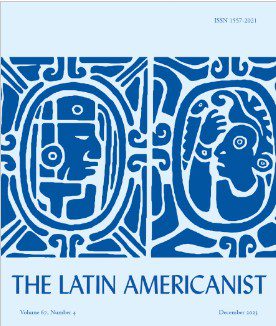Dr. Maria Labbato’s Article, “Una Gringuita en México”, Appears In The Latin Americanist

The latest issue of The Latin Americanist just came out, and our former student and colleague Maria Labbato has an article out! A great review of Jurgen’s new book also appeared in this issue. The links work through Project Muse. The Latin Americanist, Volume 68, Number 3, September 2024
Abstract
US-born Janet Riesenfeld (1914–1998), known in Mexico as Raquel Rojas (the actress) and Janet Alcoriza (the screenwriter), was an important figure of the Golden Age of Mexican Cinema and participant in the Spanish Republicans’ cultural production in exile in Mexico. Despite collaborating on at least eighty screenplays between 1946 and 1965, including one entitled Una Gringuita en México (1951), she is mentioned only briefly in the studies of her Spanish exiled associates: second husband Luis Alcoriza (1918–1992) and Surrealist Luis Buñuel (1900–1983). It is during a period of increased national film production in Mexico that Riesenfeld created a niche as an American woman importing Spanish images while disrupting cultural fixities in Mexican popular culture. Building on transnational and mobility studies, this article employs historical biography and transcultural frameworks of the Golden Age of Mexican Cinema to illuminate more fully foreign women’s productions to Mexican cultural life and the contributions of the European exile community. Integrating reviews, journalism, and analysis of film, it suggests how aspects of Riesenfeld’s identity were woven into the screenplays developed by the couple, known as the “Alcorizas,” and perhaps contributed to their success. This study adds to the conversation of the transnational peculiarities of cinema by arguing that the screenwriting team parodied notions of cultural authenticity when the film industry applied greater national protections, and that despite sexism, Riesenfeld negotiated creative space as a woman and a foreigner. Riesenfeld’s multifaceted entrance into the Mexican film industry provides a biographical case study of the various transnational and gendered dynamics of the war and postwar periods in film production, namely in writing.
